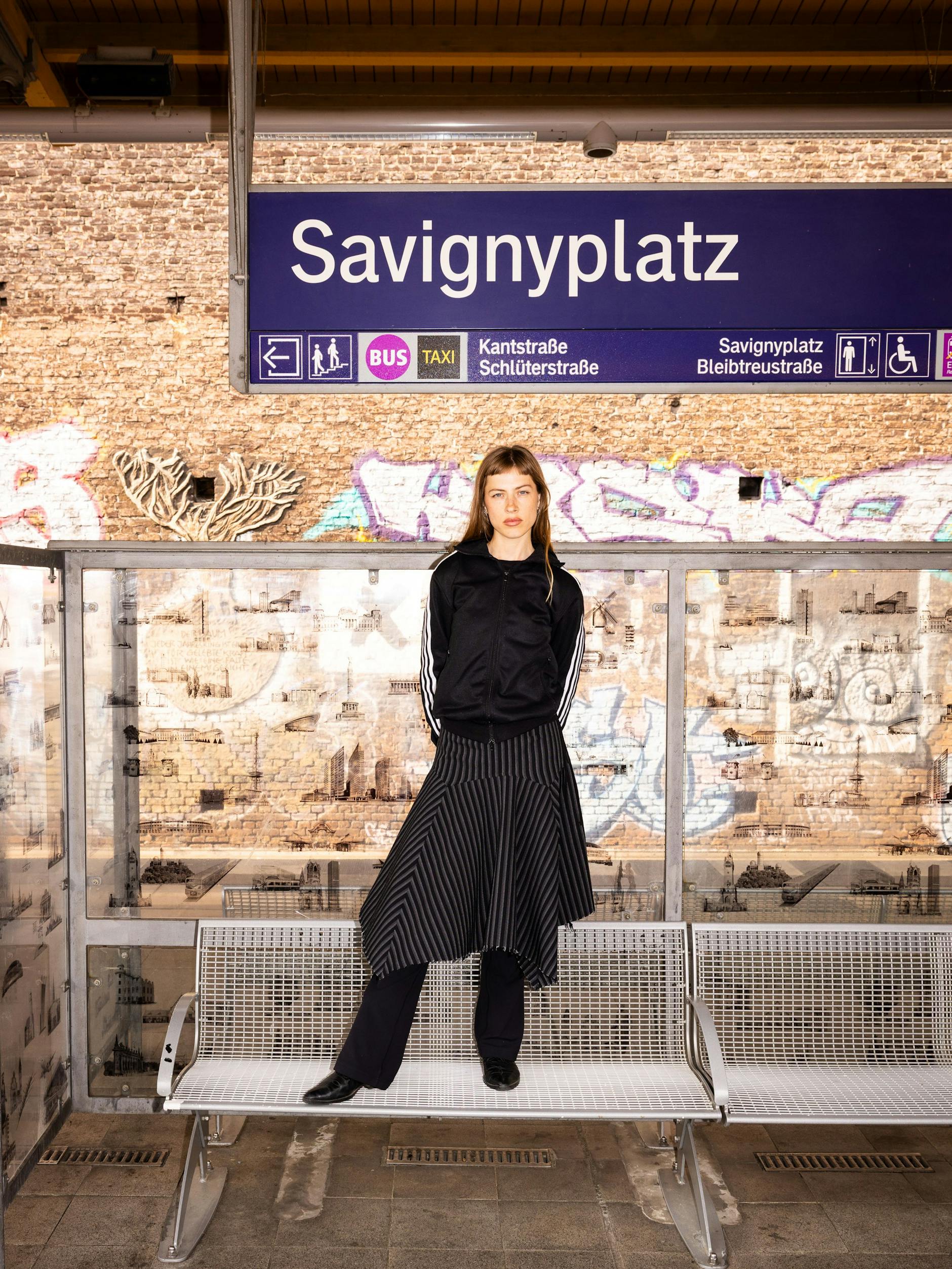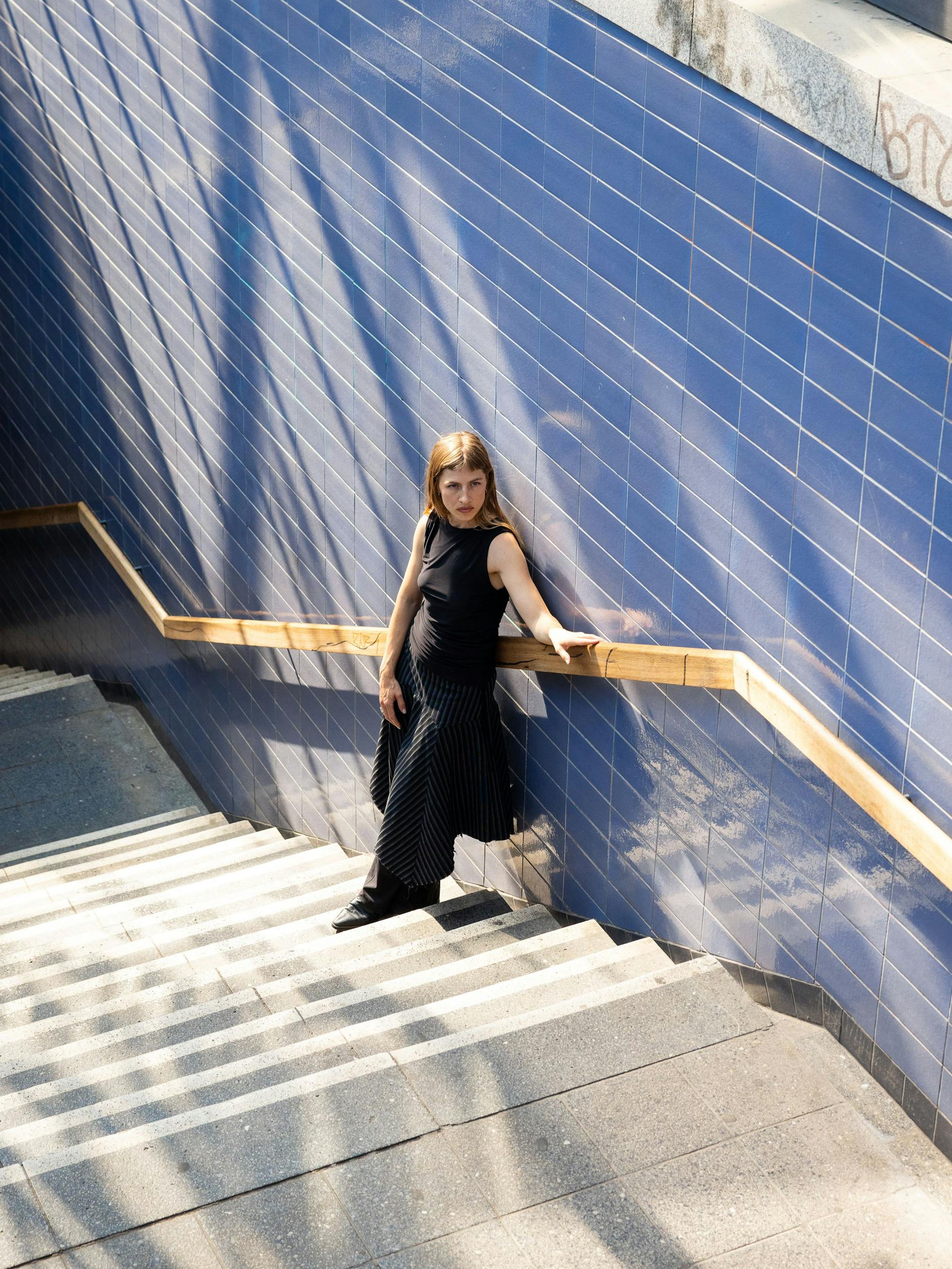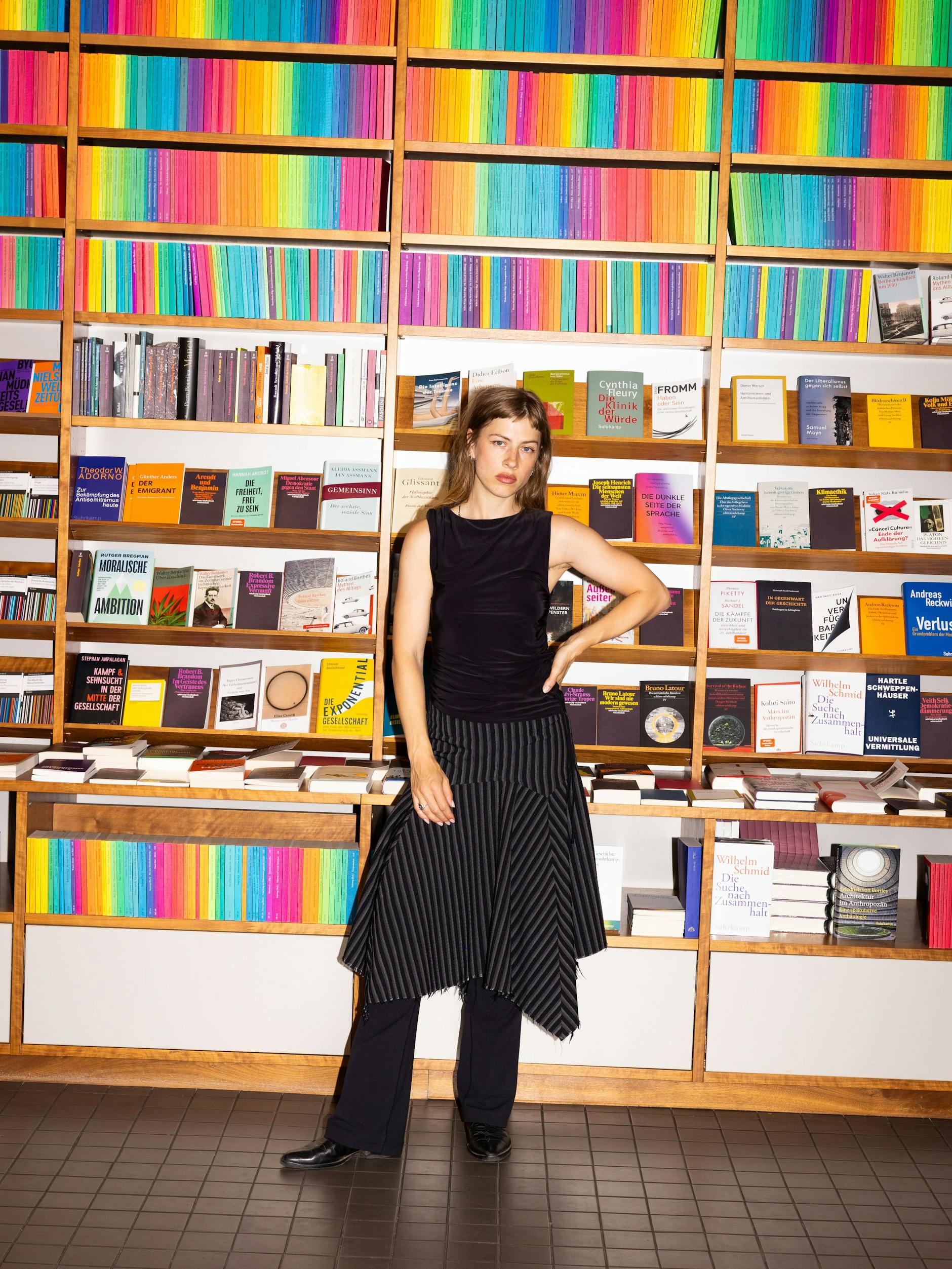A meeting with Paulina Czienskowski in Berlin: This woman writes so powerfully

It's a public holiday in Berlin, and the streets are unusually deserted. Paulina Czienskowski is waiting in front of a coffee shop chain under the S-Bahn arch, overlooking Savignyplatz. She's drinking a cow's milk cappuccino. The occasion for the meeting is her recently published second novel, which explores the themes of motherhood and female silence. It's good to be glad that this author, unlike her characters, shares her thoughts with the world, and that despite the overload of a toddler—"I'm a ball playing pinball: I bounce back and forth between the boards, back and forth, without a hope of recovery," one of her texts says —and a cold that's been lingering for weeks, she finds time for a rather spontaneous meeting. Remember: public holiday!
It's always interesting to meet someone in person you think you know from the number of photos circulating online. Apart from a sheer stroke of cat-eye kohl, she's wearing no makeup. Three silver rings jingle in each ear, which she occasionally plays with while talking. Her bangs are micro-short in a Berlin style, and she never puts on the sunglasses that belong to the decade after her birth during the conversation, even though the sun is glaring. Otherwise: black Adidas tracksuit jacket under a denim jacket trimmed in blue faux fur, flared trousers, mini bag. Back to the nineties! Funny because she actually longs for the decade of her mother's career, the eighties.
A text about the motherThe 36-year-old, who seems very approachable in conversation, is one of a dying breed of true Berliners. She grew up near meeting places, learned to ride a bike on the Ku'damm, and later moved to Schöneberg, Wilmersdorf, Prenzlauer Berg, Mitte, and other cities before returning to her roots. The other cities: Greifswald, whose provincial structures she found comforting, to study art history and German, and Paris for an internship. She then learned her journalistic craft back in her hometown, at the Tagesspiegel, a media outlet that was a red rag to her family and about which she is reluctant to speak today, avoiding the particularly sensitive mandatory hours due to illness. Speaking of red rags: Even back then, a political awareness of patriarchal structures and social injustice was knocking on Czienskowski's mind.

She became known, among other things, for a text about her mother . By chance, the daughter learned about her wild past as a model, punk icon, and jungle bartender at a legendary West Berlin disco with David Bowie as a regular clientele. By chance, that is: A bondage fashion designer praised Iris Czienskowski's beautiful breasts. Oops! This text, which is definitely worth reading, explores the question of whether everything was better in the past, or rather, why the mother lived so much more wildly and extravagantly than her daughter, true to the motto "Anyone who can remember the 80s wasn't there." As Zeit magazine put it: "Theoretically, I'm as free as they were back then. I have almost every opportunity. Looking back, I rarely couldn't do what I wanted. But as I delve into the world before my time, I notice how a vague longing keeps rising within me. There's this carefreeness, the thoughtlessness, the willingness to take risks, that I don't have, the 'just do it.'"
Social networks to make Berlin a better place to liveIt's been almost ten years since the text was published, and it's unlikely that the daughter would "just do it" now, especially since she now has a three-and-a-half-year-old son of her own. She lives within walking distance of the S-Bahnbogencafé with his father, a musician and artist whom she met at a magazine release party. "I like going to the playground on Knesebeckstrasse with my son, where I used to play myself. I like this new occupation, seeing the city through children's eyes." The transformation into a Charlottenburg resident seems to have been completed, at least in part: "I like that I don't meet 120 people a day here, but on the other hand, I still know enough to recharge my social batteries."

Fittingly, during the conversation, a trench-coated man she went to school with stops in front of her for a quick chat, almost as if in a village square. According to Czienskowski, this is the kind of social network that is needed to make Berlin a livable place. Assuming she were a district politician, what else would be on her agenda? "Play streets and subsidies for youth centers and schools. To relieve the burden on parents, but also because it's worth investing in children as the future of our society."
As someone who hosted a podcast called "What are you afraid of?", it's only natural to ask her the same question. "That due to a hierarchical view of humanity, the freedom of some leads to the lack of freedom of others. That psychosocial services are being abolished. And that if we don't unite around serious social and left-wing policies, the gap between rich and poor will continue to widen." She also finds the cuts to the cultural budget worrying. "What is it that draws people to this city? All the spaces for thought and experience, the inclusiveness, the independent scene, not just the 80-euro opera ticket." Berlin may not need her as a person, but it does need people who help shape it. Finally, she mentions the fear of losing control. Firstly, the fear as a mother, where she must simultaneously maintain control, i.e. protect her child from harm. On the other hand, there is the question of one's own image, for example, when, she says with a laugh, someone comes along and writes a portrait of her - although this used to be her main journalistic discipline.
Books about motherhood are rightly filling the shelvesBecause she believes a strong left-wing political opposition is needed, she is a member of the party, "although there is also criticism of the Left." However, she lacks the time for real party work. On the other hand, her writing resembles a socially critical weapon, even if it has increasingly evolved from journalistic to literary. In 2018, Korbinian Verlag published "Manifesto Against Emotional Atrophy," a call for a naive belief in love. Its follow-up, "Remembering to Be Yourself," is to be understood as a female stream of consciousness and a search for repressed feelings.
Her first novel, "Taubenleben," published in 2020 shortly before the lockdown, follows a similar path. It is quite self-referential—not to be confused with autofiction—and revolves around a Generation Y member's search for identity. The arrangement of the follow-up, also published by Aufbau-Verlag, is more complex. Four generations appear in it: a young, extremely overwhelmed mother, her own mother and grandmother, and the nameless baby. "The Moon Is Well" is a poetic approach to the question of what we pass on and the diverse ways in which women, especially those with children, are silenced. The vexed question of the degree of autofiction unfortunately has to be asked.

The 36-year-old waves it off. "The mother in the book isn't my own, nor is the grandmother. It's about writing spaces for myself without anyone being able to say, 'It wasn't like that.'" A bit like the whispering game of Chinese whispers, where details are added and omitted until something completely new emerges. What is certain, however, is that Czienskowski's own experiences with a newborn found their way into the text. "Contrary to my intention, after the birth, I discovered internalized misogynistic tendencies in myself, the devaluation of other mothers, for example. At the same time, I asked myself whether I was even allowed to write about becoming a mother and being a mother. Marcel Reich-Ranicki once said, 'Who cares what a woman thinks, what she feels while she's menstruating? That's not literature—that's a crime.' Things like that seep in." It's good that she, like more and more authors of her generation, is ignoring this old-white-man rubbish. Books about motherhood are rightly filling the shelves these days, from Antonia Baum to Rachel Cusk, Julia Weber, and Daniela Dröscher to Leslie Jamison, whose "Splitter" (Splitter) truly shocked Czienskowski, "this universal experience reflected in the thought of writing." However, she first became interested in this kind of literature through her own pregnancy.
“Children absorb everything around them like sponges”"The Moon Is Well" also deals with speechlessness, with women who, through parenting, take up no space, and with the question of whether we become like our parents. The author's assessment: "Children absorb everything around them like sponges, and their caregivers bear a correspondingly large amount of responsibility. Sometimes I find it unbelievable that there isn't a mandatory parenting course before birth, like the first aid course before getting a driver's license. But the truth is, nothing that happens is predictable."
Her own mother certainly seems to be more of a role model than a negative projection screen. "Actually, I'm already like her." Especially since Czienskowski definitely doesn't want to go back to her twenties, that time of "mental swimming." And away from Berlin, with its slashed cultural budget? No, she's too deeply rooted here for that. "Even if I sometimes demonize its background noise, I need it for my well-being." Creative work is also apparently necessary, even if writing means a certain amount of isolation. Last year, she wrote a text for the Heilbronn Theater, staged by director Lena Brasch. She occasionally writes radio plays for Deutschlandfunk, and she's not completely lost to journalism either.
Apart from that, she thinks a lot, especially about time and the lack of it: "My notes app is full." Speaking of smartphones: What is her Berlin soundtrack? It depends on the phase of her life. After a look at the Spotify app, she names Lorde's "What Was That" and Addison Rae's "Diet Pepsi" as her current pop favorites, although she mostly prefers audiobooks or podcasts, such as Sternstunde Philosophie or those on the political situation, "because I think I have to feed myself with content in every free moment because time has become so much more scarce with a child." It is probably also this soundtrack that dominates the conversation on this village-like West Berlin holiday: the rattling of the S-Bahn and the chugging of tourist trolleys.
Paulina Czienskowski: The Moon Is Well. Novel . Blumenbar, March 2025. 192 pages, 22 euros
Do you have feedback? Write to us! [email protected]
Berliner-zeitung





